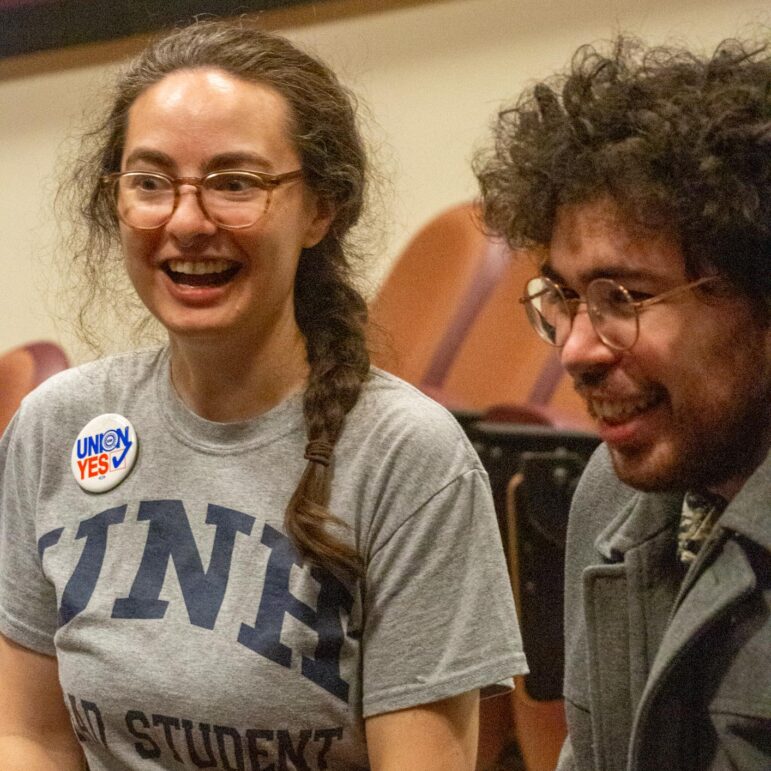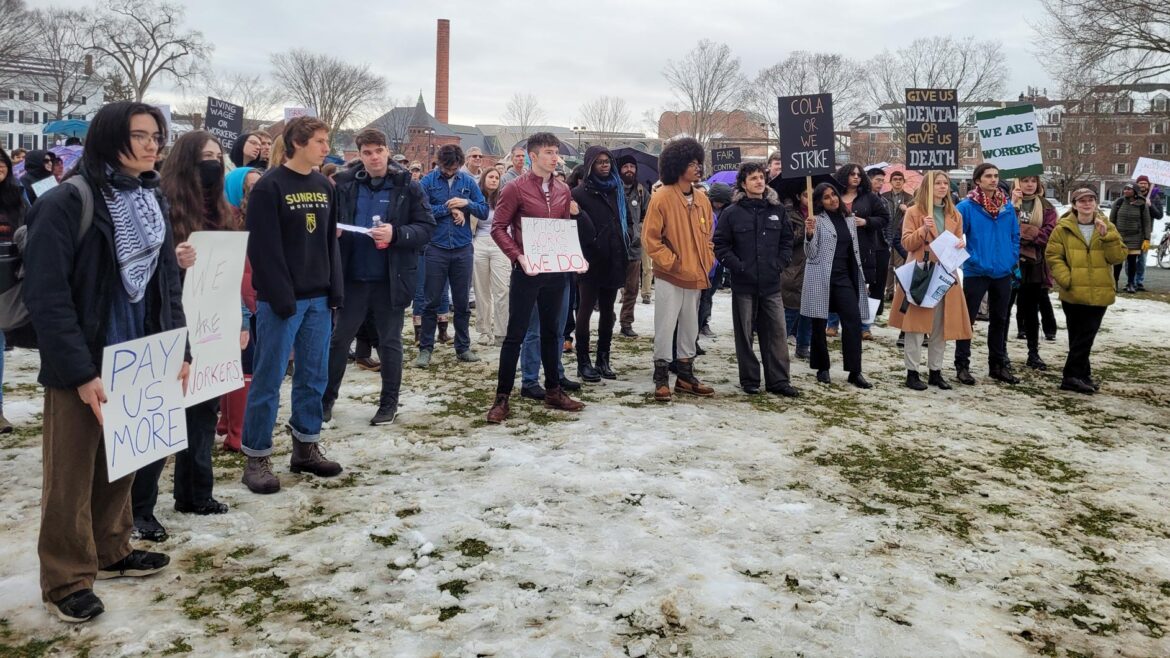
By Arnie Alpert, Active with the Activists
Arnie Alpert spent decades as a community organizer/educator in NH movements for social justice and peace. Officially retired since 2020, he keeps his hands (and feet) in the activist world while writing about past and present social movements.
Unionized graduate students took steps forward this week both at Dartmouth College in Hanover and the University of New Hampshire in Durham.
Dartmouth grad students walked out of their labs and classrooms Wednesday for a rally on the Dartmouth Green and talked about a possible strike if they don’t get a positive response to their demands for higher pay and better benefits. And about a hundred miles away, in an election supervised by the Public Employee Labor Relations Board (PELRB), UNH grad students voted 455 to 8 to join the United Auto Workers Union (UAW).
Dartmouth grad students voted last April to unionize and join the United Electrical Workers (UE), which represents grad students at MIT and six other campuses. Calling themselves Graduate Organized Labor at Dartmouth, or GOLD-UE, they have been at the bargaining table with the college administration for seven months and have reached tentative agreements in a number of areas, including grievance procedures.
A college spokesperson says, “It is common for initial union contract negotiations to take 12 to 18 months.” But it was obvious Wednesday that the union was unhappy with the pace of negotiations, especially the administration’s slow response to their proposals regarding pay and benefits.
“We gave them our proposals in mid-January, so it’s been over two months,” Genevieve Goebel, a member of the GOLD-UE’s bargaining team, told me before the rally. “No word from them. They keep on saying that they’re disorganized, and that they’re going to need more time.”
“We have had successful first contract negotiations at MIT, at Northwestern, at the University of Chicago, at other locations in half the time,” added Zach Knipe, a UE staff member who has been involved in the Dartmouth negotiations. “The delaying is unacceptable.”
Several other employee unions are engaged in labor struggles at Dartmouth. Two weeks ago, Dartmouth said that it would refuse to bargain with the recently unionized basketball team and force them to take the university to federal court. Two other campus unions, representing non-academic staff, are currently in negotiations, as are the recently organized campus librarians.
Speaking Wednesday on the Dartmouth Green to an assembly of about 200 supporters, GOLD-UE members addressed topics including the high cost of living, dental care, and childcare benefits. Lia Michaels, who is working toward a PhD in molecular and cellular biology, said she has a one-year-old daughter and spends two-thirds of her Dartmouth stipend on childcare. What the union wants, she said, is for graduate students to be able to use a college childcare center which offers services on a sliding scale based on income but is currently inaccessible to graduate student employees.
A steady drizzle that started midway through the rally did not seem to dampen the enthusiasm of the grad students, who chanted, “Who runs Dartmouth? We run Dartmouth.” As the rally closed, the union passed out pledge cards, saying, “If my union authorizes a strike, I pledge to honor our collective decision by withholding my teaching and research labor in solidarity with my fellow graduate workers.” A strike authorization vote could be on the agenda for the union’s general meeting next week.
Strikes on college campuses have not been unusual in recent years. Three thousand grad students walked out Monday at Boston University. Last year there were major strikes at Rutgers and the University of Michigan, where Sam Schaffer-Morrison, who grew up in Warner, is working on a PhD in forest ecology. He said the five-month strike was hard and revealed “how little the university actually cares about us.” It also revealed, he said, that “the amount we get paid, the health care we get, is a direct result of the union.”
Schaffer-Morrison said pay was frozen during the COVID pandemic while the cost of living, especially for housing, rose dramatically in the Ann Arbor area. The new contract came with a substantial pay increase, plus improvements in other benefits. “The benefits that we’ve gained from the union have been amazing,” he said, including “just knowing that if something goes wrong, you have an organization that can support you.”
Successful graduate student union organizing began at the University of Wisconsin in Madison in 1969, emerging out of protests against the university’s cooperation with the Selective Service during the U.S. war in Vietnam. The Teaching Assistants Association (TAA) won recognition after a strike lasting several weeks in 1970.
Dexter Arnold of Nashua, who began graduate study at Madison shortly after the strike, said “The key to the TAA’s success was this dual commitment to educational quality for our students and bread and butter issues,” including health coverage for spouses of grad students and pregnancy leave.
Arnold chaired the union’s grievance committee for several years. “We didn’t win every case,” he recalled, “but we made a difference. We saved people’s jobs, prevented management from revoking a job offer, and overturned some misclassifications that would have cheated people out of pay, health insurance and tuition remission. We enforced class size limits.”
Following the formation of the TAA at Madison, unionization was sporadic for years due to changes in the makeup of the National Labor Relations Board. The latest union organizing wave began in 2016, when the NLRB ruled grad students are employees with collective bargaining rights. The pace intensified during the COVID pandemic.
New unions of graduate student employees, postdoctoral scholars, and researchers formed on 26 campuses in 2023, representing more than 48,000 workers. Most of them are affiliated with traditional unions, with the UAW and UE representing the largest numbers.
The identification of grad students as workers relates to a largescale shift in academic employment. According to a 2023 report by the American Association of University Professors, the “workforce has shifted from mostly full-time tenured or tenure-track faculty to mostly contingent faculty,” including full and part-time faculty with no access to tenure. AAUP also said grad student employment is going up at more than twice the rate of full-time and part-time faculty.
“Highly educated workers—frustrated by poorly paid and precarious employment options—have increasingly turned to unionization to improve their situation since the Great Recession, and in some sectors even earlier,” Ruth Milkman and Joseph van der Naald explained in a report called “The State of the Unions 2023. “Graduate student workers and adjuncts employed in higher education are an extreme case of this phenomenon: they are not merely college-educated but typically have (or are pursuing) advanced graduate degrees, yet their job prospects have deteriorated dramatically as contingent employment has increasingly replaced the tenure track jobs that were once the norm in institutions of higher education.”
Jed Siebert, who is working toward a PhD in forestry at UNH, said union organizing there started among students in natural resources and physics before spreading to other departments. After talking with several unions, he said the organizing committee decided the UAW was the best fit. Academic workers now make up nearly one quarter of the UAW’s 400,000 members nationwide.
“All of the research that gets done at UNH, all of the teaching that gets done at UNH, would not be possible without the labor of graduate students,” Siebert said. “And our pay or benefits most certainly don’t reflect that.”
Like the students at Michigan and Dartmouth, the UNH union’s demands will likely center around compensation, including pay, health care, and other benefits. Due to low pay, he said, “There’s only a certain kind of person who can become a grad student at UNH.” Most UNH graduate workers make about $22,000 for the academic year, with more for grad students who also work during the summer.
The UNH union election was held Wednesday and Thursday in the Granite State Room in the Memorial Union Building, where nearly 700 graduate research assistants, teaching assistants, and graduate assistants were eligible to vote.
“It’s really hard to make ends meet because rent is really expensive in the area,” said Lee Hildebrand, who is finishing up a masters in soil science. While she does not expect to remain at UNH, she said the union will benefit those who come along after. “I’m happy that this union can really help those who are coming in the next semester.”
Anh Tran, who is studying civil engineering, cast the final vote. “It’s beneficial to have someone represent me,” he said, expressing concerns about the high cost of health care, tuition, and fees.
Kristin Petagna, who teaches Intro to psychology, sat in the hallway outside the Granite State Room while others trickled in to vote. When the polls closed at 4 pm, she joined about 15 other grad students in MUB Theater II to witness the vote counting. “We’ve been not considered employees, and we work really hard and care about our work,” she explained. “I’m really excited to be recognized for that, and paid justly for that, and just be able to have a living wage.”
In Theater II, Doug Ingersoll, the PELRB’s executive director, and Becky Black pulled batches of yellow ballots from three wooden boxes. With union and university representatives watching, Ingersoll examined each ballot and added it to a pile indicating whether the vote was for or against representation by the UAW. As the union pile grew taller, it was almost immediately apparent that the pro-union side would win.
The new UNH Graduate Employees Union is not trying to pick a fight with the administration, which in contrast to Dartmouth has been relatively cooperative so far, according to Siebert. “We’re doing this because we really like the work we’re doing. And we want it to be sustainable for everybody,” he said.
After the votes were tallied and the results announced, UNH released a statement saying, “We are pleased that the election was conducted in a fair manner consistent with PELRB rules. UNH is committed to following the appropriate processes with all labor organizations on campus and we look forward to negotiating in good faith to reach a new collective bargaining agreement with UNH GEU.”
“With a union, we will be able to sit down and bargain with the administration as equals,” said Eric Trautman-Mosher, who is working on a degree in history. “We hope to continue raising the standards for graduate workers here and across the country.”
Following a lengthy bargaining session with the Dartmouth administration Friday, Zach Knipe of the UE said the college was definitely aware of the Wednesday walkout and came forward with a substantive counter to the union’s demands for higher pay. “There’s still a long way to go,” he said, but he left today’s session feeling encouraged.
A Dartmouth representative said the university “is committed to working with GOLD-UE to reach a mutually beneficial agreement and is appreciative of the efforts of the GOLD-UE bargaining committee.”
Schaffer-Morrison’s advice to the unions is “stick with it.” He recommended the grad students look for support in their communities, especially with undergrads, who may have more contact with teaching assistants than they do with faculty members. If it comes to a strike, he emphasized the importance of mutual support. When the University of Michigan students were picketing last year, he said, “the union provided breakfast and lunches. And even if you weren’t on the picket line, you could go to the kitchen and grab a lunch and hang out with people that were picketing. And it just created a really nice community around the strike, because strikes are really hard.”
“It’s gonna be hard,” Schaffer-Morrison said, “but it’s worth it. And stick together, you know, solidarity.”






